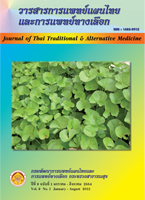Acute and Chronic Toxicity Study of Benjathiposoth Extract
Main Article Content
Abstract
A Thai traditional medicine called Benjathiposoth has been reported to possess hypotensive activity. The recipe for preparing medication contains 10 types of herbal materials. An acute toxicity study in mice by gavaging the ethanolic extract of Benjathiposoth at single doses of 2.5, 5.0 and 10.0 g/kg showed that the extract produced neither abnormal signs nor mortality and its LD50 value was more than 10.0 g/kg, which is approximately 1,000 times greater than the human therapeutic dose. The oral six-month chronic toxicity study of the extract was investigated in 144 Wistar rats divided into six groups (each of 12 per sex). Groups 1 and 2 were control groups given with distilled water orally and 1.0% tragacanth solution respectively. Groups 3 to 6 were experimental groups administered orally extract of Benjathiposoth at doses of 10, 100, 500 and 500 mg/kg/day. After six months, the last group (500-R) was further raised without the extract for two weeks in
order to assess reversibility of any adverse effects. The results revealed that the Benjathiposoth extract did not affect growth, food intake, health and behaviors of the test animals. The extract at the doses given caused no significant differences in any hematological parameters between the treatment and control groups. Clinical chemistry assays revealed a significant increase in total serum protein in the female group treated with the highest dose of the extract, which was still within the reference interval of normal rats, whereas other parameters
showed no significant deviation from the controls. Histopathology of various visceral organs showed that the male groups receiving the extract at 100 mg/kg and higher have a higher incidence of fatty liver. Moreover, these male groups as well as the 500-R group, had higher incidence of kidney congestion when compared with their corresponding control groups. Nevertheless, no pathological change was found in glomerular and tubular kidneys. The incidence of histopathological findings in some organs did not show any dose dependency; therefore, it was considered as not having been contributed by the extract. In summary, the extract of Benjathiposoth produced no serious acute or chronic toxicity in experimental animals.
Article Details
References
2. วุฒิ วุฒิธรรมเวช. สารานุกรมสมุนไพร รวมหลักเภสัชกรรมไทย. กรุงเทพฯ: สำนักพิมพ์โอเดียนสโตร์; 2540. 620 หน้า.
3. Hajiniwa J, Harada M and Morishita I. Properties of essential oil components of aromatics and their pharmacological effect on mouse intestine. Pharmacological studies in crude drugs. VII. Yakugaku Zasshi 1963;83:624.
4. Aphisariyakul A. Pharmacological study of some medicinal plants on rat ileums. Chiang Mai Pharm 1987;3(1):8.
5. Hollander F, Lauber FU and Stein JJ. The pH of gastric mucous secretion. Am J Physiol 1948;152:645-51.
6. Hollander F and Lauber Fu. Eugenol as a stimulus for gastric mucous secretion. Proc Soc Exptl Biol Med 1948;67(1):34-7.
7. Dar A, Behbahanian S, Malik A and Jahan N. Hypotensive effect of the methanolic extract of Mimusops elengi in normotensive rats. Phytomedicine 1999;6(5):373-8.
8. Gunasekera SP, Kinghorn AD, Cordell GA and Farnsworth NR. Plant anticancer agents. XIX Constituents of Aquilaria malaccensis. J Nat
Prod 1981;44:569-72.
9. Soonthornchareonnon N, Ubonopas L, Kaewsuwan S and Wuttiudomlert M. Lupinifolin, a bioactive flavanone from Myriopteron extensum (Wight) K. Schum. stem. Thai J Phytopharm 2004;11(2):19-28.
10. Reutrakul V, Leewanich P, Tuchinda P, Pohmakotr M, Jaipetch T, Sophasan S and Santisuk T. Cytotoxic coumarins from Mammea
harmandii. Planta Med. 2003; 69(11):1048-51.
11. Kumphune S, Prompunt E, Phaebuaw K, Sriudwong P, Pankla R, Thongyoo P. Anti-inflammatory effects of the ethyl acetate extract of
Aquilaria crassna inhibits LPS-induced tumour necrosis factor-alpha production by attenuating P38 MAPK activation. Int J Green Pharm 2011;5(1):43-8.
12. Chen SW, Min L, Li WJ, Kong WX, Li JF and Zhang YJ. The effects of angelica essential oil in three murine tests of anxiety. Pharmacol
Biochem Behav 2004;79:377-82.
13. Taufiq Hassan Md, Shawkat Ali M, Alimuzzaman Md and Zahir Raihan S. Analgesic Activity of Mesua ferrea Linn. Dhaka Univ J Pharm Sci
2006;5(1-2):73-5.
14. Grover JK, Khandkar S, Vats V, Dhunnoo Y and Das D. Pharmacological studies on Myristica fragrans-antidiarrheal, hypnotic, analgesic. Methods
Find Exp Clin Pharmacol 2002;24(10):675-80.
15. Gad SC. The rat: pathology. In: Gad SC, Chengellis CP, editors. Animal Models in Toxicology. New York: Marcel Dekker; 1982. p. 78-81.
16. Nolf Diamiani CE, Rossoni LV, Vassallo DV. Vasorelaxant effects of eugenol on rat thoracic aorta. Vascul Pharmacol 2003;40(1):59-66.
17. Lahlou S, IL, Leal Interaminense LF, Caldas Magalhães PJ, Lealcordoso JH, et al. Cardiovascular effects of eugenol, a phenolic compound present in many plant essential oils, in normotensive rats. J Cardiovasc Pharmacol 2004;43(2):250-5.
18. Said MM. The protective effect of eugenol against gentamicin-induced nephrotoxicity and oxidative damage in rat kidney. Fundam Clin
Pharmacol 2010 (original article).


